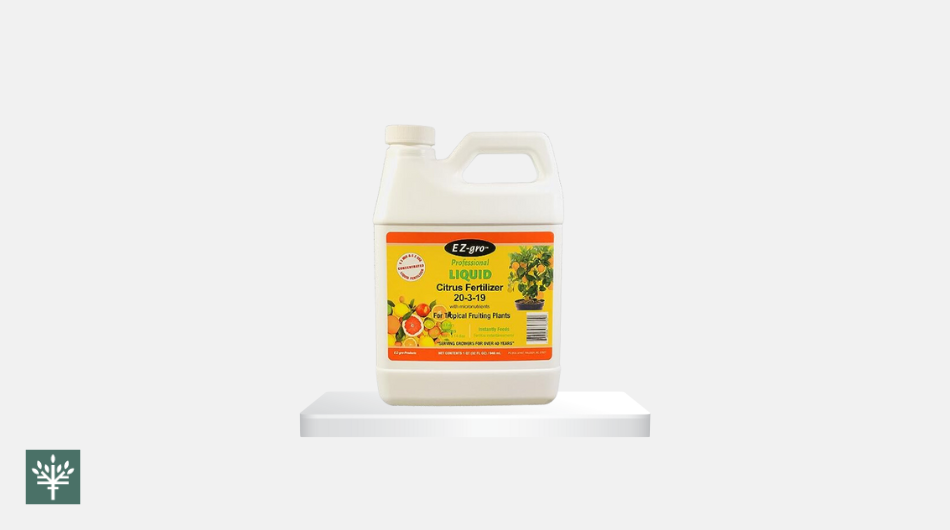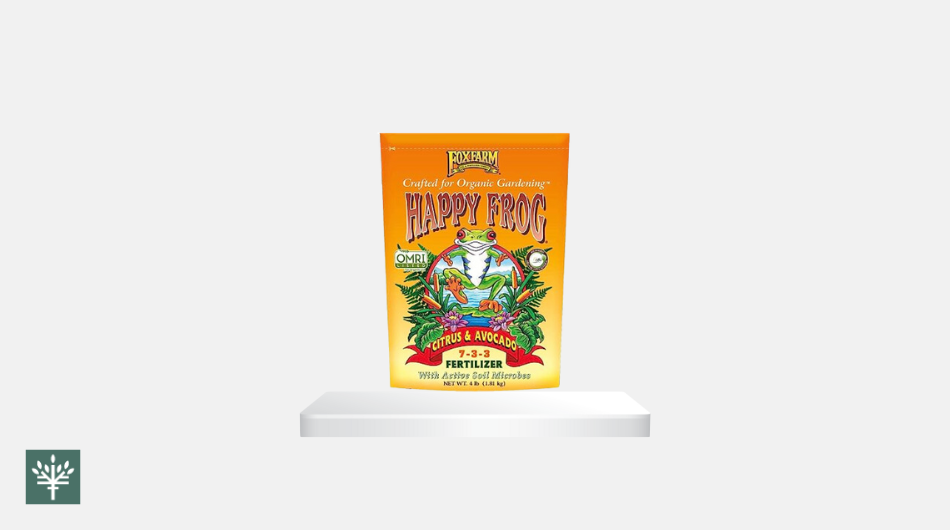Top 7 Best Citrus Tree Fertilizers In 2023: Liquid, Spikes and More
by Carl Anderson
Updated on Aug 5, 2023
Like every tree, citrus trees require specific nutrients for their roots, trunks, and branches to grow healthy. And like other fruit trees, the healthier the tree grows, the larger, more delicious the fruit it produces.
Trees get most of their nutrition through the soil they are planted in - but not also soil is created equal. Some soil is simply not ideal for fruit production, so you need a good fertilizer to help your trees grow.
When it comes to picking out the best fertilizer for your citrus trees, a number of different factors come into play. Things like NPK, price, volume and more are only some of the things you need to consider. What works best for one tree farmer might not work the best for another.
Don't worry - we go over everything you need and more to make the right choice for your citrus tree, be them lemon trees or grapefruit trees. Keep reading below to find out what fertilizer best suits your citrus tree situation.
List of Services
-
Best Overall - Miracle Gro Shake N' Feed CitrusList Item 2
The Miracle Grow Shake N' Feed fertilizer is the best fertilizer for citrus trees. Why? It's simple and easy to use.
-
Best Best Organic - Down To Earth Citrus FertilizerList Item 3
The Down to Earth Organic Citrus Fertilizer is robust, organic fertilizer that provides and excellent amount of nutrition to the citrus plant.
-
Best Granular - Jobe's Organic GranularList Item 1
Jobe's Organic Granular Plant Food Fruit & Citrus makes a ton of different best fertilizers list because how effective and robust it is at fertilizing.
-
Best Spikes - Miracle Grow Fruit & Citrus
Miracle Gro's Fruit & Citrus tree spikes are an easy and simple solution for the average fruit or citrus tree owner. Really, they are simple to use.
-
Best Liquid - EZ Grow Citrus Tree Fertilizer
The EZ Grow liquid fertilizer is what we call a concentred liquid fertilizer. In order to use it, you need to mix (and dilute) it with water beforehand.
-
Best Water Soluble - Jack's
Jack's Water Soluble Citrus Feed packs quite a punch with an NPK Ratio of 20-10-20. One of the best parts about this fertilizer being water soluble is that you can use it in a watering injection system for your trees
-
Best Alternative - Happy Frog
We are always happy when Happy Frog makes a top list of fertilizers; we believe this is another great granular fertilizer. Happy Frog Citrus & Avocado is a lovely, complete organic fertilizer that will do wonders for your citrus trees.
Miracle Gro Shake N' Feed For Citrus Trees - Simplest and easiest way to get the primary and secondary nutrients to your citrus trees. Check it out here.
Table of Contents
- The Top 7 Best Citrus Tree Fertilizers - Full Analysis (Updated for 2023)
- Best Overall
- Best Organic
- Best Granular
- Best Spikes
- Best Liquid
- Best Water Soluble
- Best Alternative
- Sweet New Earth's Top Pick
- How We Chose The Best Fertilizer
- Type of Fertilizer
- NPK Ratio
- Organic vs. Inorganic
- Spikes
- Type of Citrus
- Soil Nutrition
- Life Cycle
- FAQs
Things to Consider Before Buying
Nutrition
We've talked about the NPK ratio before but all you need to know is that all fertilizers will come with an NPK Ratio, which is just the nitrogen (N), phosphorus (P), and potassium (K) the fertilizers contain. The required NPK ratio will vary depending on the soil - if you live in Florida, your NPK ratio will be different than in California.
Type of Fertilizer
Fertilizers have three common types: liquid, granular, and spikes. Liquid fertilizer comes ready to use or in a concentrated form and needs to be diluted before use; granular fertilizer comes as tiny grains or pellets that you lay under the tree; spikes are driven into the soil around the tree, and they release fertilizer into the soil until they eventually dissolve. We'll go over these more in depth below.
Stage of Tree Life Cycle
Depending on what life cycle your citrus tree is in will determine the required nutrition for the soil. If you serious about growing your trees, you'll have the soil tested by a professional to accurately fertilize the tree best for its needs. Now, newly planted citrus trees (think saplings) won't need fertilizer until they are about two years old - just keep them watered properly until they are established.
Organic vs Inorganic Fertilizer
There's always the debate over whether you should use organic or inorganic fertilizer. Most citrus tree fertilizers out today are inorganic, but some organic fertilizers still exist. It's going to depend on how you feel about what you feed your citrus tree versus how to fertilize the citrus trees best so they can grow up happy and healthy and give you large, delicious citrus fruits.
The Top 7 Best Fertilizers for Citrus Trees: Our Full Analysis (Updated for 2023)
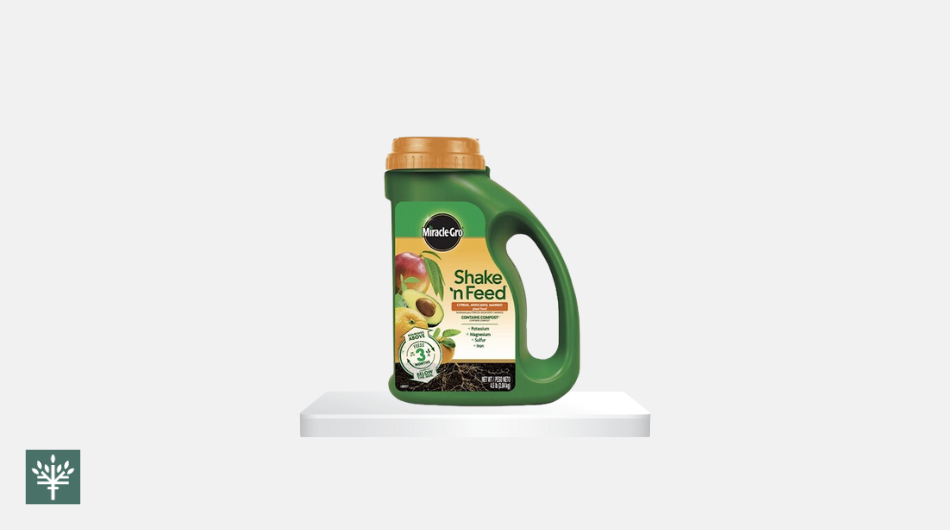
Product Specifications:
Type: Granular
Weight/Volume: 4.5-pound container
NPK Ratio: 8-2-10
The Miracle Grow Shake N' Feed fertilizer is the best fertilizer for citrus trees. Why? It's simple and easy to use. Most people aren't wanting to mix their own fertilizer, nor do they want to put spikes in the ground. They want to sprinkle their trees with fertilizer and carry on with life.
This citrus fertilizer has an NPK Ratio of 8-2-10, and it comes packed with other nutrients ideal for citrus plants, such as potassium, magnesium, sulfur, and iron. These are the types of nutrients you need to promote strong root development and foliar development, along with fostering fruit production.
Like we said, it's easy and simple to use. Put some of the granules beneath your citrus tree and you are good to go. Be sure to follow the instructions on the bottle, and avoid getting fertilizer directly on the tree trunk. Once you have the ground fertilized, go ahead and rake those into the soil's surface before you start watering them.
PROS
- Easy application
- Feeds for up to three months
- Designed for citrus plants
CONS
- Inorganic
- Requires raking into the soil
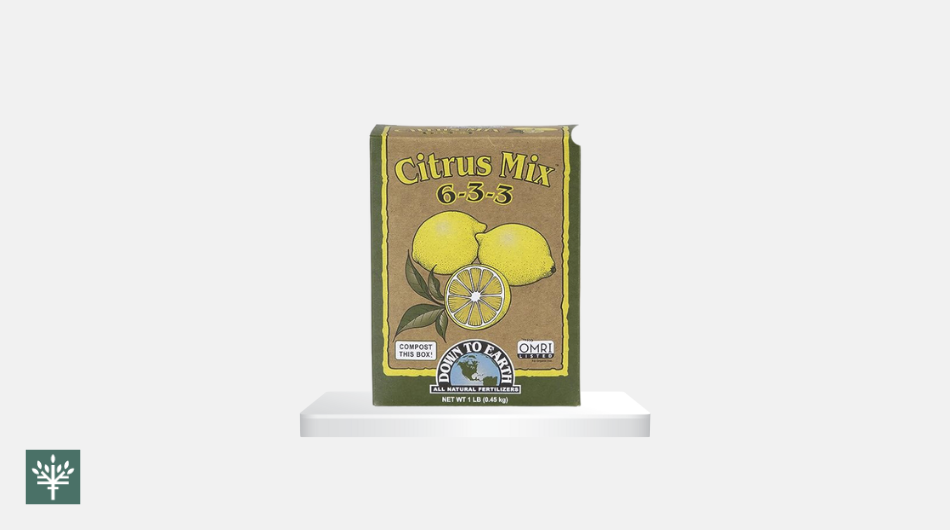
Product Specifications:
Type: Granular
Weight/Volume: 1-pound container
NPK Ratio: 6-3-3
The Down to Earth Organic Citrus Fertilizer is robust, organic fertilizer that provides and excellent amount of nutrition to the citrus plant. The mix comes in with an NPK Ratio of 6-3-3, so you have crucial primary and secondary nutrients. Secondary nutrients are things like calcium, sulfur, zinc, and iron. Not only that, but it's rated for organic production of citrus trees.
This fertilizer comes highly rated as a great option for citrus trees and all kinds of other fruit trees. People have had success using these with other fruit trees, vines and even ornamentals.
The natural organic ingredients of feather meal, fish bone meal, alfalfa meal, greensand, langbeinite, basalt, sulfate of potash, zinc sulfate and kelp meal provide an excellent range of benefits to the citrus tree so you can have huge, beautiful fruits grow quick.
PROS
- Marine-Based Forumula
- High-Quality Ingredients
- Organic fertilizer
CONS
- Expensive
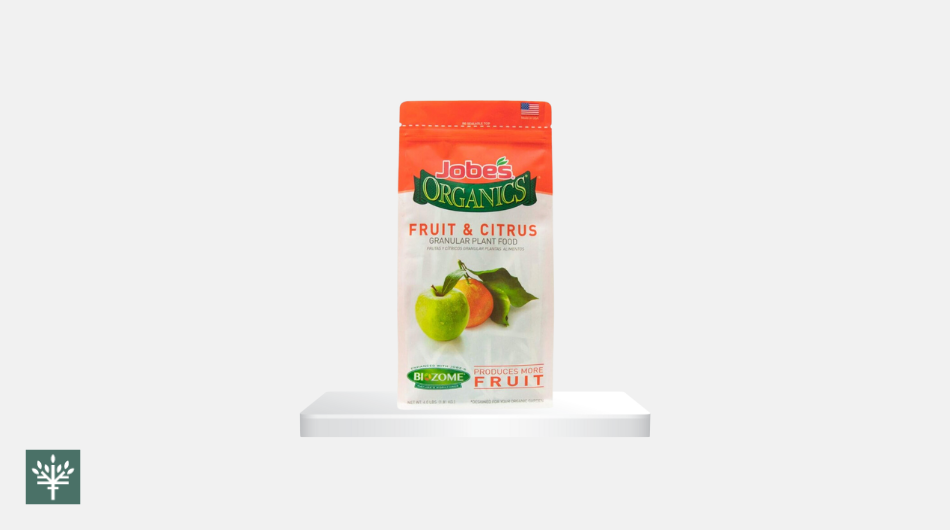
Product Specifications:
Type: Granular
Weight/Volume: 4-pound container
NPK Ratio: 3-5-5
Jobe's Organic Granular Plant Food Fruit & Citrus makes a ton of different best fertilizers list because how effective and robust it is at fertilizing. This fertilizer comes with the Jobe's Biozome advantage that is known for improving the long term quality of your tree's soil, increasing mass of tree's roots, promoting growth in season - and it does all that without the use of chemical fertilizers. That's right. It's organic.
Some people have boasted that this fertilizer is able to revive young lime trees that have yellowing and dying leaves with this fertilizer. That's not exactly a claim Jobe's might make, but seeing different kinds of anecdotal evidence for a product is always cool. This fast-acting, chemical-free fertilizer is excellent for both established and new trees.
PROS
- Easy to pour
- No synthetic chemicals
- Comes in three sizes
CONS
- Bad scent
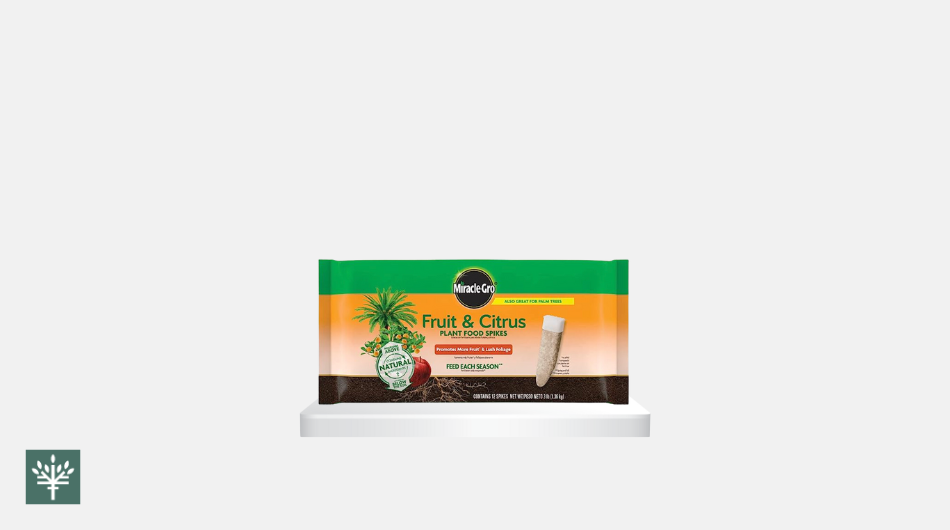
Product Specifications:
Type: Spikes
Weight/Volume: 12 Spikes
NPK Ratio: 10-15-15
Miracle Gro's Fruit & Citrus tree spikes are an easy and simple solution for the average fruit or citrus tree owner. Really, they are simple to use.
You pop one into the ground in the spring, and then again in the fall. They then give the citrus tree the fertilizer it needs over time to grow healthy roots and increase fruit production.
The fertilizer spikes have a 10-15-15 derived from natural ingredients: feather meal, bone meal, and magnetic rock. Once you hammer then, you can move on to other projects.
All you do is put the plastic cap on the spikes and then drive them into the soil with a hammer. You need to space them about 3 feet apart.
PROS
- Only needed twice per year
- Set it and forget it
- Easy to use
CONS
- Pricer than granular fertilizer
- Inorganic
Product Specifications:
Type: Liquid
Weight/Volume: 1 Quarts (32 fluid ounces)
NPK Ratio: 20-3-19
The EZ Grow liquid fertilizer is what we call a concentred liquid fertilizer. In order to use it, you need to mix (and dilute) it with water beforehand. It's great for various citrus trees such as lemon, limes, mango, orange, or even kumquat. You can use it for dwarf or large varieties, indoor or outdoor plants.
The enhanced micronutrient package delivers ideal nutrition for the plants that will improve the nutrient deficiencies common in citrus trees. All you need to do is shake well, mix it with water (per the bottle) and apply it as directed.
PROS
- Infused with micronutrients
- Large dosage of N and K
- High grade
CONS
- Requires math (just kidding but follow the package)
- Dilute before use
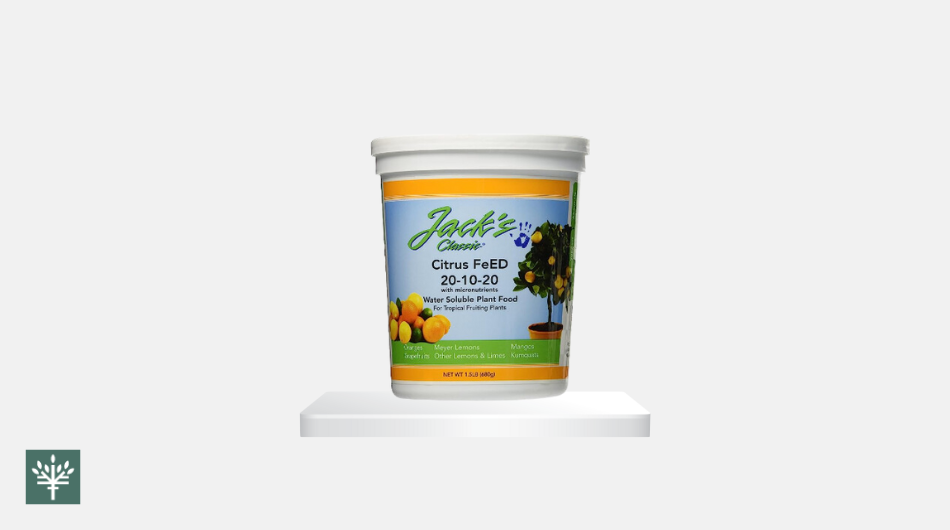
Product Specifications:
Type: Granular
Weight/Volume: 1-pound container
NPK Ratio: 20-10-20
Jack's Water Soluble Citrus Feed packs quite a punch with an NPK Ratio of 20-10-20. That's the largest N&K we have on the list, and this formula is great for all kinds of citrus trees such as Meyer lemons, regular lemons, limes, oranges, grapefruits and more.
One of the best parts about this fertilizer being water soluble is that you can use it in a watering injection system for your trees. Its ideal for very light injection watering and turns leaves noticeably greener.
PROS
- Perfect for tropical plants
- Ideal for injection watering
- Promotes new growth
CONS
- Densely packed
Product Specifications:
Type: Granular
Weight/Volume: 4-pound container
NPK Ratio: 7-3-3
We are always happy when Happy Frog makes a top list of fertilizers; we believe this is another great granular fertilizer. Happy Frog Citrus & Avocado is a lovely, complete organic fertilizer that will do wonders for your citrus trees.
You can use this for potted lemon trees, normal lemon trees or really any kind of citrus fruit tree with great results. People have even used this with guava trees having great results.
The Citrus & Avocado formula was designed to promote growth on both citrus fruit trees and avocado trees. During harvest, you can expect juicy fresh lemons, limes, and ripe avocados. Nothing better than when you apply lemon tree fertilizer and get lemons.
PROS
- Organic citrus fertilizer
- Promotes new growth
CONS
- Fishy smell
Sweet New Earth Final Choice of the Best Citrus Tree Fertilizer
We believe the best fertilizer for citrus trees is Miracle Gro's Shake N' Feed for Citrus trees. The ease of use, combined with the ideal formula as a citrus tree fertilizer, makes it perfect for citrus trees.
How We Chose the Best Fertilizer for Citrus Trees
Different citrus trees must be fertilized at different times of the year. Here are some examples of the different types of citrus trees:
- Oranges
- Tangerines
- Grapefruits
- Lemons
- Limes
For orange, tangerine and grapefruit trees, you must fertilize three times throughout the year: January or February, March or April, and then May or June. You can fertilize lemon trees in January or February, March or April and then August or September.
Again, you'll need to determine the nutrition levels of your soil to figure out the best amount of citrus plant fertilizer the soil will need.
Type
There are four types of fertilizers for fruit trees:
- Liquid
- Water soluble
- Granular
- Spikes
NPK Ratio
The NPK ratio represents the three primary nutrients in the fertilizer. These include:
- Nitrogen
- Phosphorus
- Potassium
NPK Ratio is important, but how do you know what one to use? Well, the best way is to test your soil, or buy soil where you know the nutrition levels. Serious citrus growers will test their soil, while hobbyists will do fine with using bagged soil for potted plants.
Organic Fertilizers vs. Inorganic Fertilizers
The classic organic versus inorganic debate will rage on until the end of time. And for good reason! Sometimes it feels a little bit political talking about organic vs inorganic so we'll stay out of it. We have both organic and inorganic varieties listed above.
It's going to come down to what you feel comfortable feeding your trees. We say whatever promotes the best tree health and has the maximum safety both the tree, the environment and the human. Do with that what you may. If you can get a complete organic fertilizer, then why risk exposure to chemicals.
Type of Citrus Tree
The type of citrus tree won't play a huge role in what type of fertilizer you use because most of them are designed holistically for citrus trees: lemon, limes, mango, orange, grapefruit, or even kumquat. Maybe what you need is the best fruit tree fertilizer instead.
Unless you find a fertilizer specifically for lemon trees or specifically for orange trees, you should be fine with some of the brands above. Most of this is marketing anyway - trees will require certain nutrients to grow healthy and promote new fruit growth - however, getting them those nutrients is all that matters. It doesn't matter if they are palm trees, the best palm tree fertilizer is the one that helps the plant grow.
Soil Nutrition
Now citrus trees will get nutrients from the sun, the air, their water supply and the soil. We are focused on soil here today so what's important for us to remember is what is important and ideal to supplement your citrus tree with.
The level of nutrition in your soil will be a huge factor in what type of fertilizer you buy and more specifically, what NPK Ratio combined with secondary nutrients. The best way to know this is to get the soil tested.
Taken to the extreme, let's pretend the soil was sand. The absolute bare minimum of nutrients and barely retains water which it's extremely hard for most trees and plants to grow on sand.
So you know that in order for you trees to grow, they need to be in soil that is rich in nutrients, and is able to retain water.
Life Cycle of the Tree
We mentioned above that the tree's life cycle will determine how much fertilizer your citrus tree will need. Now, there is a scientific way to describe each life cycle, and there is a practical way - for example, you wouldn't fertilize your citrus tree if its dead. So the only stages you need to know are as follows:
- Newly Planted Tree
- Small Tree
- Medium Tree
- Large Tree
Newly Planted Trees
Newly planted trees are young sapling trees. They don't require fertilizer until the roots are established. Once they are established and new growth has emerged, the tree only needs a small amount of fertilizer.
Small Trees
Small trees are roughly 2 to 3 feet tall. Their trunks are 1.25 feet in diameter. The canopy will cover 9 square feet of ground area.
Medium Trees
Medium Trees are 4 to 8 feet tall. Their trunks range from 1.25 to 4 feet in diameter. The canopy will cover 16 square feet of ground area.
Large Trees
Large trees are 10 feet tall or more. Their trunks are 6 to 10 feet in diameter. The canopy covers more than 64 square feet of ground area.
FAQs

Carl Anderson is the main author of Sweet New Earth. He is an avid outdoors enthusiast who loves gardening. He spends his time reading, hiking and learning about new ways to optimize his garden. You can learn more about him here.

